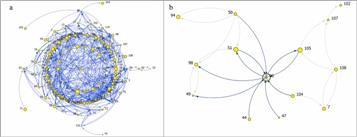A network centrality bias: Central individuals in workplace networks have more supportive coworkers |
| |
| Affiliation: | 1. University of Exeter, UK;2. Northwestern University, USA;3. Università della Svizzera italiana, Lugano, Switzerland;4. Erasmus University, the Netherlands |
| |
| Abstract: | 
Combining the results of two empirical studies, we investigate the role of alters’ motivation in explaining change in ego’s network position over time. People high in communal motives, who are prone to supportive and altruistic behavior in their interactions with others as a way to gain social acceptance, prefer to establish ties with co-workers occupying central positions in organizational social networks. This effect results in a systematic network centrality bias: The personal network of central individuals (individuals with many incoming ties from colleagues) is more likely to contain more supportive and altruistic people than the personal network of individuals who are less central (individuals with fewer incoming ties). This result opens the door to the possibility that the effects of centrality so frequently documented in empirical studies may be due, at least in part, to characteristics of the alters in an ego’s personal community, rather than to egos themselves. Our findings invite further empirical research on how alters’ motives affect the returns that people can reap from their personal networks in organizations. |
| |
| Keywords: | Motivation Social networks Communal motives Network centrality Centrality bias Stochastic Actor-oriented Models |
| 本文献已被 ScienceDirect 等数据库收录! |
|

